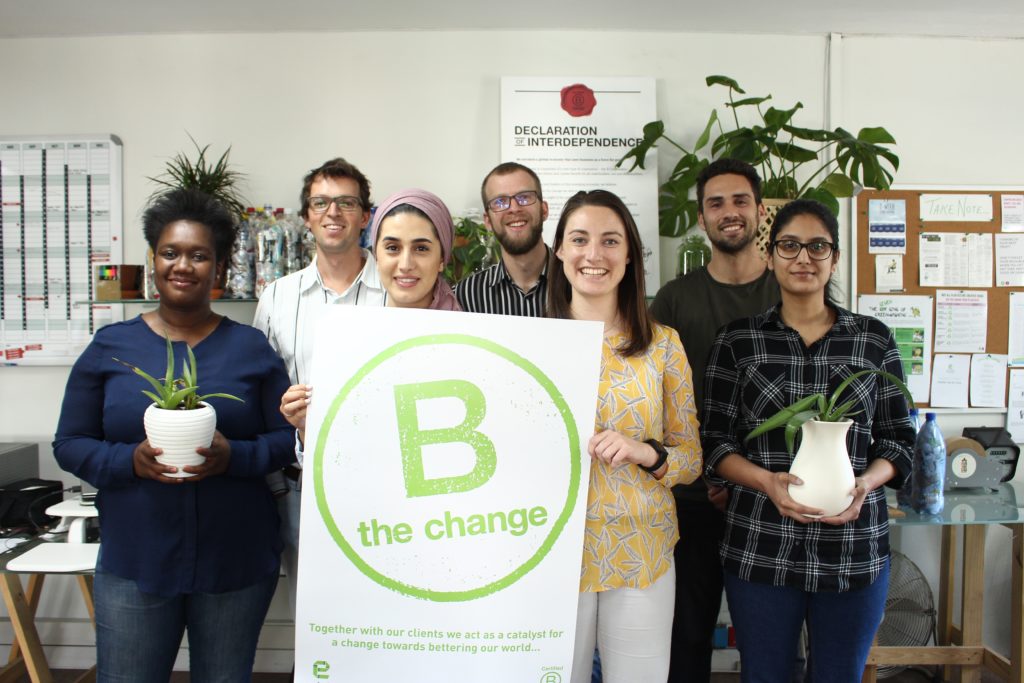During COP25, which took place in the first two weeks of December 2019, Ecolution Consulting committed to becoming Net Zero carbon by 2030 alongside other Bcorperations who took on the BCorp Net Zero Challenge. Ecolution has taken the challenge one step further by committing to Net Zero by 2025 – five years earlier than BCorp’s challenge deadline and 25 years earlier that the given IPCC deadline of decarbonsation by 2050.
Accelerating climate change and ecological breakdown have a devastating impact to all life on earth. In order to limit the impact we’re having on our planet the scientific community have come to the conclusion that the limit of average global temperature rise needs to remain under 1.5°C, when compared to pre-industrial levels.
If things proceed as they currently are, we might reach this temperature increase limit by 2030. This is an existential threat that must be treated as an ecological emergency and to which we must respond immediately, decisively and courageously.
The Paris agreement, signed in 2015, is an agreement within the United Nations Framework Convention on Climate Change (UNFCCC), dealing with greenhouse-gas-emissions mitigation, adaptation, and finance. It was put in place to largely limit the global average temperature rise, keeping it below 2 °C above pre-industrial levels; and to pursue efforts to limit the increase to 1.5 °C. Alongside this, the Intergovernmental Panel on Climate Change ( IPCC) have given the deadline to halve emissions by 2030 and that Net Zero should be reached by 2050.
From the 2nd to 13th of December 2019, The UN Climate Change Conference – COP 25 – took place in Madrid, Spain. Where countries negotiated more ambitious plans to limit global warming to 1.5°C, in line with the Paris Agreement.
With that, on 11 December 2019, B-Corporations from all over the world represented on the main stage with the President of COP to make two announcements highlighting the leadership of B Corps in Climate Action.
These announcements are as follows:
- Declaration of Climate Emergency and System Failure: Announcing that B-Corporations update their performance requirements for certification, take immediate action in their companies and advocate collectively for public policies in order to keep the average global temperature rise under an increase of 1.5°C.
- Commitment to Net Zero: on behalf of individual B-Corporations around the world making the same commitment, they will commit to achieve Net Zero (scope 1-3) by 2030, raising the bar on business leadership and proving that business success and climate action are compatible.
Leading up to COP25, Ecolution has committed to becoming Net Zero carbon by 2025, five years earlier than the Bcorp challenge set out as part of the Paris agreement and 25 years earlier than the IPCC deadline to decarbonise.
What does this mean?
Net Zero emissions occurs when any caused greenhouse gas emissions are balanced out by removing greenhouse gasses from the atmosphere (a process known as carbon removal or sequestration), for example by restoring forests or through direct air capture and storage (DACS) technology. The concept of net-zero emissions is akin to “climate neutrality.” – Source: World Resources Institute
Net zero emissions here applies to Scope 1 (direct emissions from owned or controlled sources), Scope 2 (indirect emissions from the generation of purchased energy) and most relevant Scope 3 emissions (all indirect emissions- not included in scope 2- that occur in the value chain of the reporting company, including both upstream and downstream emissions). This is achieved by foremostly reducing emissions wherever possible and using verified offsets to balance emissions that cannot be eliminated.

At Ecolution we are already working hard to reduce our emissions through energy efficiency interventions, behaviour change and conservation activities. We track our sustainability efforts and progress through the use of a sustainability dashboard, accessible on our website. We are constantly looking for opportunities to not just save energy but to also avoid or reduce other carbon emitting activities. This list includes but is not limited to:
- No domestic hot water use in kitchens or bathrooms
- Avoiding the mechanical cooling and heating but rather passive methods like natural ventilation, fans or blankets or hot water bottles at desks in winter
- cycling to the office when possible
- avoiding driving or flying in favor of video conferencing where justifiable
- being nearly paperless in the office.
- Diverting more than 90% of our waste from landfill through waste reduction, composting, recycling and eco bricking
- An employee “eco champion” of each environmental category has been elected within the office in order to record and drive progress
- Signage is also placed around the office in order to remind all employees to be sustainable in their day-to-day office activities.
The list of interventions is growing to continue to minimise our emissions which will make it easier, more affordable and more ethical to then offset to zero.
Furthermore we are already quantifying our scope 1 and 2, plus business air travel (which is part of scope 3). By the end of this financial year, we will have offset our flights and have a handle on total scope 1 and 2 emissions for offset consideration.
By 2022 we plan to have the bulk, if not all scope 3 emissions quantified, giving us another 2-3 years to work on reducing it and then offsetting the balance by 2025.
When asking the Ecolution team what achieving Net Zero by 2025 means to them…
Andre Harms, founder.
“The commitment of Net Zero by 2025 starts with taking ownership of our emissions and driving them down to zero through a whole lot of ways. We as a team need to look at what our emissions are and identify them one by one to really take ownership to drive them down to zero.”
Ayesha:
“It means to take greater responsibility for our impact on the environment and inspire others to do the same.”
Sibulele:
“More companies should create awareness, committing to Net Zero by 2025 has affected my personal sustainability journey at home as well.”
Stephen:
“It’s about saving the planet but, more specifically, being more efficient and better at what we’re doing to reach that goal.”
Thomas:
“Net Zero by 2025 will require a fair amount of perseverance, but I’m confident we will make it happen. We really need to practice what we preach.”
Catherine:
“I hope that reaching this goal, as a small company, will have multiple ripple effects on every client that we work with or individual that we interact with on a daily basis. If we can do it as a small company really big businesses will look at us and be inspired.”
Wardah:
“The commitment to NetZero by 2025 means holding myself accountable for my actions and assisting to contributing to insure that there is a future for the generations to come.”
Now, all that’s left to do is to fully commit to taking ownership of our emissions and to drive them down to zero. We have worked hard to set and achieve our own goals thus far and we’re really excited about the creativity that the team will bring to the party to ensure that our sustainability journey keeps evolving.


